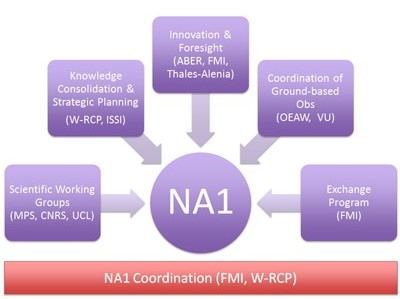NA1: Innovation Through Science Networking - Project completed 31 August 2019
Innovation in the area of planetary science is driven by the demanding environments in which spacecraft and their instruments must work, by the large datasets and challenging observations that must be made to understand planetary systems, and by the sheer curiosity of humans as a species to understand their own world in relation to the others we have found and are finding.
This WP provided the key scientific backbone of EPN2020 and focused on the human resources of the project itself and beyond - on researchers and engineers working in the field of planetary exploration in the ERA, contributing to overall capacity building in Europe. Our ambition was to integrate and network the providers of planetary science infrastructures with the users and with the wider European Planetary Science community and European Industrial partners. The activities contributed to broaden international S&T cooperation as well.
Main objectives
- integrate and network the providers of planetary science infrastructures with the users and with the wider European Planetary Science community and European Industrial partners.
- activities will also contribute to broaden international S&T cooperation as well.
- promote innovative measurement techniques in forthcoming planetary science/mission, with commercial and industrial companies including SMEs
- integrate scientists from the Inclusiveness States into EPN2020
- support the inclusion of amateur communities in European planetary science campaigns
- engage young scientists with the European planetary science community
- promote Open Access as a method and tool to disseminate data and research results
- support the activities of EPN2020 with exchange of experts
- link the Europlanet2020 RI with other Horizon 2020 activities.

Each Task of the NA1 focused on a special aspect of the WP. An integrated system of workshops, team meetings, and personnel exchanges established to improve the scientific and innovation impact of the infrastructure, and focused on important future strategic issues. The knowledge consolidation and foresight activity identified key science issues and produced integrated reference books on major science themes that bridged-the-gap between the results of present/past missions and the scientific preparation of future ones. Part of the working group activities was devoted to integrate participants of other tasks.
Europlanet 2020 RI received funding from the European Union's Horizon 2020 research and innovation programme under grant agreement No 654208.
Project completed 31 August 2019